Traditional Chinese sleep tea blends ancient wisdom with modern science to offer natural relief for sleep troubles. You'll find key ingredients like chamomile, valerian root, and jujube seeds, known for their calming properties. To brew the perfect cup, use high-quality herbs and steep for 5-7 minutes in hot water. Drink your tea 30-60 minutes before bedtime, and combine it with good sleep hygiene practices for best results. While generally safe, be aware of potential side effects and consult a healthcare provider if you're pregnant or taking medications. By exploring this time-honored remedy, you'll discover a holistic approach to better sleep.
Origins of Chinese Sleep Tea
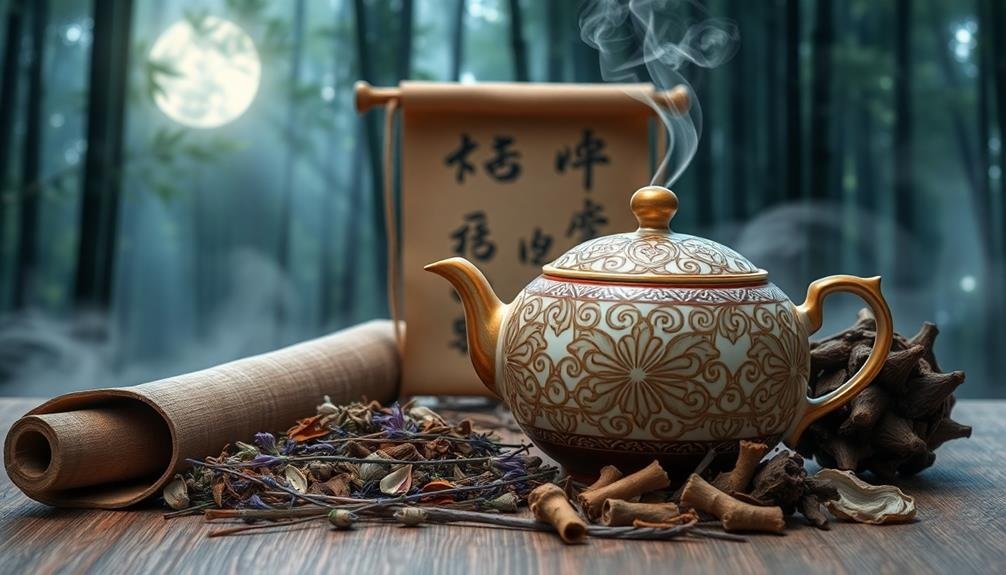
While the exact origins of Chinese sleep tea are difficult to pinpoint, its roots can be traced back thousands of years to Traditional Chinese Medicine (TCM). This ancient healing system has long recognized the importance of sleep for overall health and well-being.
Chinese herbalists and practitioners developed various herbal blends to promote relaxation and improve sleep quality. You'll find that many of these traditional sleep tea recipes were passed down through generations, with each family or region having its own unique blend.
The concept of using herbs for sleep aid wasn't limited to tea alone; it was often part of a holistic approach to health that included dietary changes, lifestyle adjustments, and other natural remedies.
As TCM spread throughout Asia, the practice of drinking sleep-inducing teas gained popularity. Different regions incorporated local herbs and ingredients, leading to a diverse array of sleep tea variations.
Over time, these traditional recipes have been refined and adapted, combining ancient wisdom with modern scientific understanding of sleep and herbal properties. Today, you can find numerous Chinese sleep tea blends that draw on this rich historical legacy.
Key Ingredients and Their Benefits
At the heart of traditional Chinese sleep tea lie several key ingredients, each chosen for its specific properties and benefits.
You'll often find chamomile in these blends, renowned for its calming effects and ability to reduce anxiety. It's rich in apigenin, an antioxidant that binds to certain brain receptors, potentially decreasing insomnia.
Another common ingredient is valerian root, which has been used for centuries to improve sleep quality. It may increase levels of gamma-aminobutyric acid (GABA) in the brain, promoting relaxation and reducing sleep latency.
You'll also encounter jujube seeds, known as suan zao ren in Chinese medicine. These seeds can help alleviate insomnia and anxiety while promoting deeper, more restful sleep.
They're often paired with longan fruit, which is believed to nourish the heart and calm the mind.
Lavender is frequently included for its soothing aroma and potential to reduce stress and improve sleep quality.
Some blends may also feature passionflower, known for its mild sedative effects and ability to enhance overall sleep quality.
Preparing the Perfect Brew
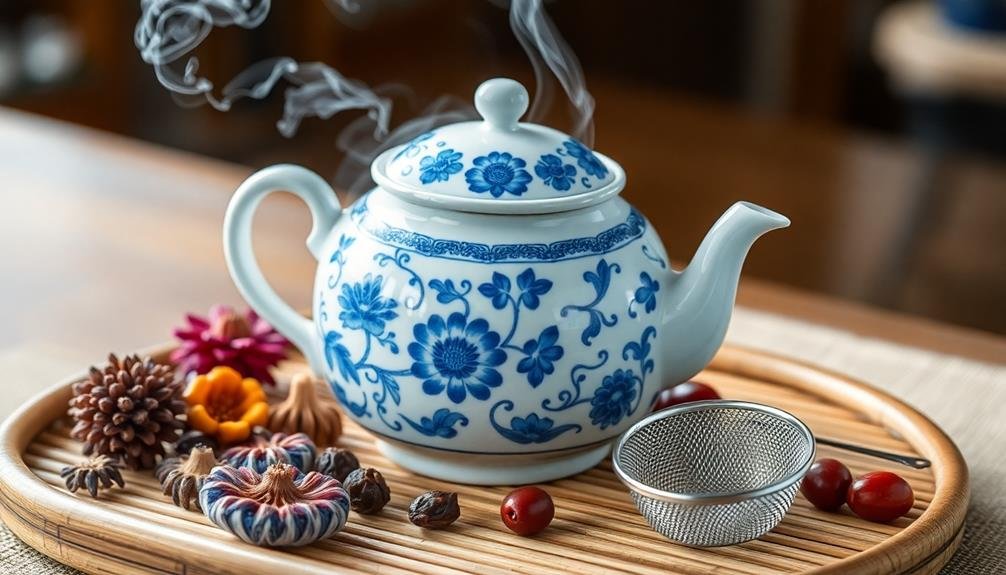
To craft the ideal Traditional Chinese Sleep Tea, you'll need to focus on three key aspects.
Start by selecting high-quality, fresh tea ingredients to guarantee the best flavor and efficacy.
Next, pay attention to your water temperature, as different teas require specific heat levels for maximum extraction.
Choosing Quality Tea Ingredients
When it comes to preparing the perfect brew of traditional Chinese sleep tea, selecting high-quality ingredients is crucial. You'll want to focus on sourcing authentic, organic herbs and flowers that are commonly used in traditional Chinese medicine for promoting sleep and relaxation.
Start with a base of chamomile or chrysanthemum flowers, known for their calming properties. Look for whole, dried flowers rather than pre-packaged tea bags to guarantee freshness and potency.
Add valerian root, which has been used for centuries to improve sleep quality. Choose small, dried pieces of root rather than powdered form for better flavor and effectiveness.
Consider including jujube seeds, also known as sour date seeds, which are believed to nourish the heart and calm the mind. Select whole, dried seeds and crush them lightly before use.
Longan fruit is another excellent addition, known for its ability to promote relaxation. Opt for dried longan fruit without added sugars or preservatives.
Optimal Water Temperature
Achieving the ideal water temperature is essential for extracting the full benefits and flavors from your Chinese sleep tea ingredients. Different tea types require specific temperatures to optimize their taste and therapeutic properties.
For most Chinese sleep teas, which often contain delicate herbs and flowers, you'll want to use water that's hot but not boiling. Aim for a temperature between 175°F and 185°F (79°C to 85°C). This range allows for gentle extraction without scalding the herbs or releasing bitter compounds.
To achieve this, bring your water to a boil, then let it cool for about 2-3 minutes before pouring it over your tea blend. If you don't have a thermometer, you can judge the temperature by observing the water. At the ideal range, you'll see tiny bubbles forming at the bottom of the pot, known as "crab eye" bubbles in Chinese tea culture.
Avoid using water that's too hot, as it can damage the delicate compounds in your sleep tea and result in a bitter, less effective brew. Remember, patience in preparation leads to a more soothing and beneficial cup of tea.
Steeping Time Matters
Three key factors contribute to the perfect brew of Chinese sleep tea: water temperature, tea quantity, and steeping time. While we've discussed water temperature, it's essential to understand that steeping time plays an equally important role in extracting the ideal flavor and benefits from your tea.
For most Chinese sleep teas, you'll want to steep for 3 to 5 minutes. This duration allows the herbs to release their essential oils and active compounds without becoming bitter or overpowering. Start with 3 minutes if you prefer a milder taste, and adjust accordingly.
Don't be tempted to rush the process. Steeping for too short a time won't fully extract the tea's beneficial properties, while over-steeping can result in a bitter, unpleasant taste and potentially reduce the tea's effectiveness.
Use a timer to guarantee consistency. Once the steeping time is up, remove the tea leaves or bag immediately to prevent further extraction. If you're using loose leaf tea, a strainer or infuser can make this process easier.
Timing and Dosage Recommendations
Proper timing and dosage are vital for maximizing the benefits of traditional Chinese sleep tea. You'll want to consume your tea about 30 to 60 minutes before bedtime to allow the herbs to take effect. This timing guarantees you'll be ready for sleep when you hit the pillow.
As for dosage, it's generally recommended to start with one cup and adjust as needed.
Remember, everyone's body reacts differently to herbs, so it's important to listen to your body and consult with a healthcare professional if you have any concerns.
Here are some key points to keep in mind:
- Start with a lower dose and gradually increase if necessary
- Don't exceed more than 2-3 cups per day
- Avoid drinking the tea too close to bedtime to prevent nighttime bathroom trips
- Be consistent with your tea routine for best results
If you're taking any medications or have existing health conditions, it's especially important to check with your doctor before incorporating sleep tea into your routine.
Combining With Sleep Hygiene Practices
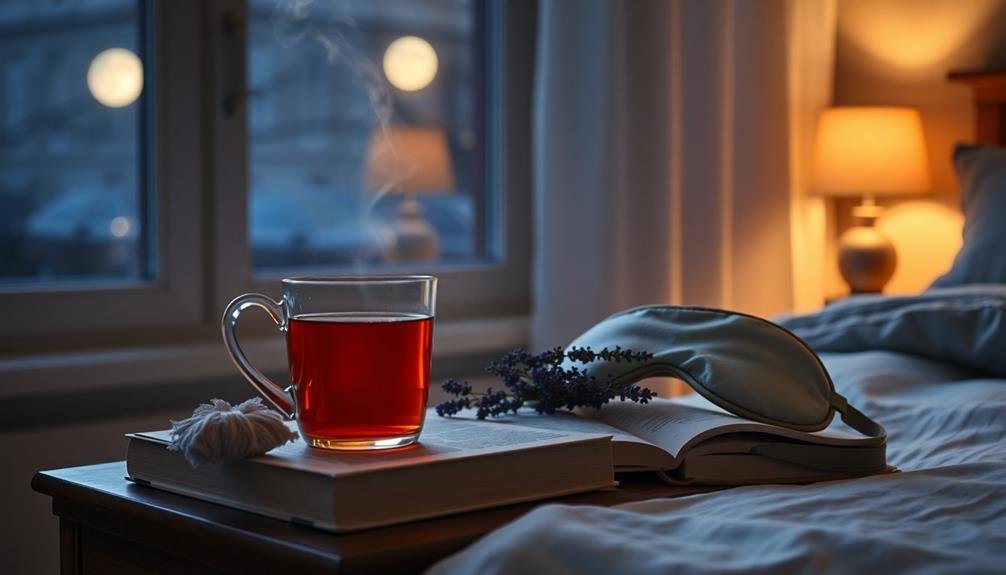
While traditional Chinese sleep tea can be beneficial on its own, combining it with good sleep hygiene practices can greatly enhance its effectiveness. To maximize the tea's sleep-promoting properties, establish a consistent bedtime routine. Start by dimming the lights and avoiding blue light from electronic devices at least an hour before bed. This helps signal your body that it's time to wind down.
Create a calm sleep environment by keeping your bedroom cool, quiet, and dark. Use comfortable bedding and consider using white noise or earplugs if necessary. As you sip your sleep tea, practice relaxation techniques like deep breathing or gentle stretching to further reduce stress and tension.
Avoid caffeine, alcohol, and heavy meals close to bedtime, as these can interfere with sleep quality. Instead, have your sleep tea about 30-60 minutes before you plan to sleep. Pair this with light reading or meditation to promote relaxation.
Modern Research on Traditional Remedies
Modern scientific research has begun to validate many traditional Chinese sleep tea ingredients.
You'll find clinical trials examining the efficacy of herbs like valerian root and chamomile for improving sleep quality.
These studies are uncovering the mechanisms of action behind these time-honored remedies, shedding light on how they interact with your body's sleep-wake cycle.
Scientific Validation of Ingredients
Although traditional Chinese sleep teas have been used for centuries, recent scientific research has begun to validate the effectiveness of their ingredients. You'll find that many common components in these teas have been scientifically proven to promote relaxation and improve sleep quality.
Studies have shown that chamomile, a frequent ingredient in sleep teas, contains apigenin, a compound that binds to specific receptors in your brain, potentially inducing sleepiness. Valerian root, another popular component, has been found to increase gamma-aminobutyric acid (GABA) levels in your brain, which may help reduce anxiety and promote better sleep.
Research has also validated the sleep-enhancing properties of other traditional ingredients:
- Lavender: Shown to improve sleep quality and increase slow-wave sleep
- Passionflower: May increase total sleep time and reduce nocturnal awakenings
- Magnolia bark: Contains compounds that can help reduce anxiety and promote relaxation
- Jujube seeds: Rich in saponins and flavonoids that may have sedative effects
While more research is needed to fully understand the mechanisms behind these ingredients, the growing body of scientific evidence supports the use of traditional Chinese sleep teas as a natural remedy for sleep issues.
Clinical Trials and Efficacy
Building on the scientific validation of individual ingredients, researchers have conducted clinical trials to assess the overall efficacy of traditional Chinese sleep teas. These studies aim to determine whether the combined effects of various herbs in sleep teas provide measurable benefits for insomnia and sleep quality.
You'll find that several randomized controlled trials have shown promising results. In one study, participants who consumed a blend of jujube, valerian root, and chamomile reported significant improvements in sleep onset time and overall sleep quality compared to a placebo group.
Another trial focusing on a tea containing passionflower and magnolia bark demonstrated reduced anxiety levels and enhanced sleep duration.
It's important to note that while these findings are encouraging, more extensive research is still needed. The complexity of traditional Chinese herbal formulas and individual variations in response make it challenging to draw definitive conclusions.
However, the growing body of evidence suggests that these time-honored remedies may indeed offer relief for some sleep issues. As you consider incorporating Chinese sleep teas into your routine, consult with a healthcare professional to verify they're appropriate for your specific needs.
Mechanisms of Action Explored
Recent scientific advancements have shed light on the mechanisms behind traditional Chinese sleep teas. Researchers have identified key compounds in these herbal blends that interact with your body's sleep-wake cycle. You'll find that many of these teas contain natural sedatives and anxiolytics, which help calm your nervous system and promote relaxation.
The active ingredients in Chinese sleep teas work through various pathways:
- Increasing gamma-aminobutyric acid (GABA) production, a neurotransmitter that reduces brain activity
- Modulating serotonin levels, which regulate mood and sleep patterns
- Influencing melatonin synthesis, the hormone responsible for your circadian rhythm
- Reducing cortisol levels, helping to alleviate stress and anxiety
These mechanisms explain why you might feel more relaxed and sleepy after drinking these teas.
Some herbs, like valerian root and chamomile, have been found to bind to specific receptors in your brain, mimicking the effects of sleep-inducing medications. By understanding these actions, scientists can now validate the effectiveness of traditional remedies and potentially develop new sleep aids based on these time-tested formulations.
Potential Side Effects and Precautions
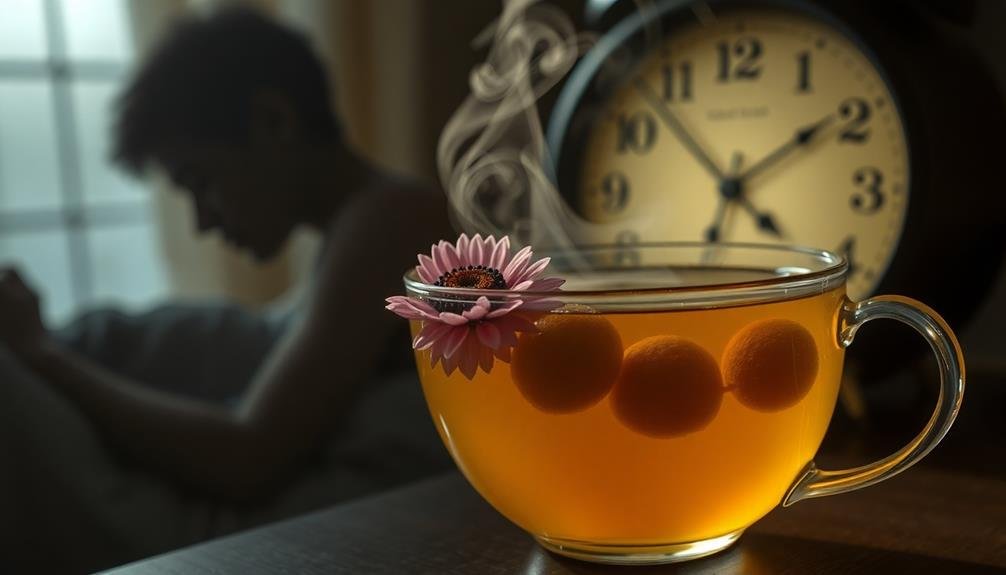
While Traditional Chinese Sleep Tea is generally considered safe, there are several potential side effects and precautions to keep in mind. You might experience mild digestive issues like nausea or stomach upset, especially if you're sensitive to certain herbs.
Some people report headaches or dizziness after consuming these teas, particularly if they're not used to the ingredients.
If you're pregnant or nursing, it's essential to consult your healthcare provider before trying any sleep tea. Certain herbs can interact with hormones or affect fetal development.
Similarly, if you're taking medications, be aware that some tea ingredients may interact with them, potentially altering their effectiveness or causing adverse reactions.
Be cautious if you have allergies to plants in the daisy family, as some sleep tea ingredients may trigger reactions.
Don't overuse these teas, as excessive consumption can lead to dependency or tolerance. If you experience any unusual symptoms or prolonged sleepiness, discontinue use and seek medical advice.
Sourcing Quality Herbs and Teas
To guarantee you're getting the safest and most effective Traditional Chinese Sleep Tea, it's vital to source high-quality herbs and teas. Look for reputable suppliers who specialize in Chinese herbal medicine and have a track record of providing authentic, organic ingredients. These suppliers should be able to provide detailed information about the origin, harvesting, and processing methods of their herbs.
When selecting your herbs and teas, consider the following factors:
- Freshness: Opt for herbs that have been recently harvested and properly stored.
- Purity: Choose organic options to avoid pesticides and other contaminants.
- Authenticity: Confirm the herbs are correctly identified and labeled.
- Sustainability: Support suppliers who use environmentally friendly practices.
It's also important to verify that the supplier follows Good Manufacturing Practices (GMP) and has obtained necessary certifications.
Don't hesitate to ask for lab reports or third-party testing results to confirm the quality and safety of the products. By taking these precautions, you'll make sure that your Traditional Chinese Sleep Tea isn't only effective but also safe for regular consumption.
Customizing Your Sleep Tea Blend
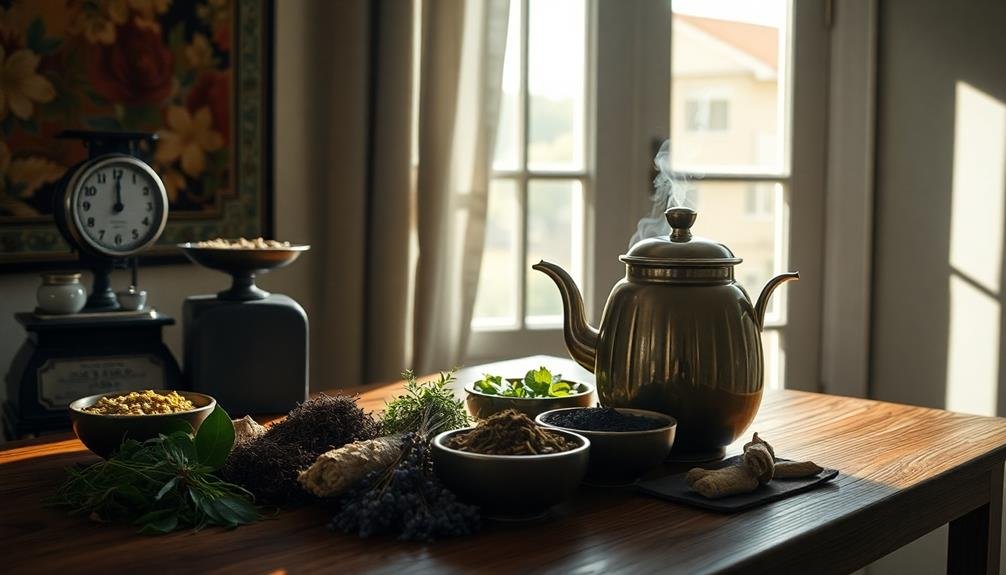
Creating your own personalized sleep tea blend allows you to tailor the ingredients to your specific needs and preferences. Start with a base of chamomile or valerian root, known for their calming properties.
Then, add other herbs based on your desired effects. For stress relief, consider adding lavender or lemon balm. If you're looking to boost relaxation, try passionflower or hops.
Experiment with different ratios to find your ideal combination. Begin with equal parts of each herb, then adjust as needed. Don't forget to include a small amount of licorice root or stevia leaf for natural sweetness. Be cautious when using potent herbs like valerian, and start with smaller amounts.
To enhance flavor, add a pinch of mint or lemongrass. For a warming effect, include a small piece of ginger or cinnamon stick.
Remember to steep your blend for 5-10 minutes in hot water, allowing the herbs to release their beneficial compounds. Keep a journal to track which combinations work best for you, and don't hesitate to consult a herbalist or traditional Chinese medicine practitioner for personalized advice.
Incorporating Into Nightly Routine
To seamlessly incorporate traditional Chinese sleep tea into your nightly routine, start by brewing the perfect cup about an hour before bedtime.
You'll want to time your tea consumption for ideal effect, allowing your body to absorb the calming properties while avoiding late-night bathroom trips.
As you sip your tea, create a calming environment by dimming lights, reducing screen time, and engaging in relaxing activities to enhance the tea's sleep-inducing benefits.
Brewing the Perfect Cup
Settling into a nightly routine with traditional Chinese sleep tea can transform your bedtime experience. To brew the perfect cup, start by selecting high-quality, organic ingredients.
Heat fresh, filtered water to just below boiling point, around 195°F (90°C). This temperature preserves the delicate flavors and beneficial compounds of the herbs.
Place your chosen blend of sleep-promoting herbs into a teapot or infuser. Pour the hot water over the herbs and let them steep for 5-7 minutes, depending on your desired strength. Strain the tea into your favorite mug and allow it to cool slightly before drinking.
For the best results, consider these tips:
- Use a timer to guarantee consistent steeping time
- Experiment with different herb combinations to find your ideal blend
- Avoid adding sweeteners, as they may interfere with sleep-inducing properties
- Sip your tea slowly, mindfully savoring the aroma and flavor
Timing for Optimal Effect
The timing of your traditional Chinese sleep tea consumption plays a crucial role in its effectiveness. To maximize its sleep-inducing properties, aim to drink your tea 30 to 60 minutes before your intended bedtime. This allows ample time for the active compounds to be absorbed and take effect.
Incorporate the tea into your nightly wind-down routine. As you sip, engage in relaxing activities like reading or gentle stretching. Avoid screen time, which can interfere with your body's natural melatonin production.
For those new to sleep teas, start with a smaller amount and gradually increase to find your ideal dosage. Be consistent with your timing; your body will begin to associate the tea with sleep, enhancing its effectiveness over time.
| Time Before Bed | Activity |
|---|---|
| 60 minutes | Prepare and drink tea |
| 45 minutes | Read or gentle stretching |
| 30 minutes | Meditation or deep breathing |
| 15 minutes | Final bathroom visit |
Creating a Calming Environment
Creating a calming environment is essential for maximizing the benefits of your traditional Chinese sleep tea. As you incorporate this ancient remedy into your nightly routine, consider the atmosphere in which you'll be enjoying it. Dim the lights in your bedroom or living space, creating a soft, warm ambiance that signals to your body it's time to wind down.
Choose a comfortable, quiet spot where you can sit and sip your tea without distractions.
To further enhance your tea-drinking experience and prepare for a restful night, consider these elements:
- Use aromatherapy with calming scents like lavender or chamomile
- Play soft, soothing music or nature sounds
- Remove electronic devices from your immediate surroundings
- Wrap yourself in a cozy blanket or wear comfortable sleepwear
As you drink your tea, focus on its warmth and flavor, allowing yourself to be present in the moment. Take slow, deep breaths and let go of the day's stresses.
Frequently Asked Questions
Can Chinese Sleep Tea Be Consumed During Pregnancy or Breastfeeding?
You should consult your healthcare provider before consuming Chinese sleep tea during pregnancy or breastfeeding. Some herbal ingredients may not be safe for expectant or nursing mothers. It's best to err on the side of caution.
How Does Chinese Sleep Tea Compare to Over-The-Counter Sleep Aids?
You'll find Chinese sleep tea offers a gentler, more natural approach compared to OTC sleep aids. It's often caffeine-free and contains herbs that promote relaxation. However, it may work more slowly and have milder effects than synthetic medications.
Are There Any Drug Interactions With Chinese Sleep Tea Ingredients?
You should be cautious about potential drug interactions with Chinese sleep tea ingredients. It's best to consult your doctor or pharmacist, especially if you're taking medications. Some herbs can interact with blood thinners, antidepressants, or other drugs.
Can Children Safely Consume Chinese Sleep Tea?
You shouldn't give children Chinese sleep tea without consulting a pediatrician. It's not typically recommended for kids, as some ingredients may be too strong. If you're concerned about your child's sleep, seek professional medical advice instead.
Does Chinese Sleep Tea Have Any Impact on Morning Grogginess?
You'll likely experience less morning grogginess with Chinese sleep tea. It's designed to promote natural sleep cycles, so you're more likely to wake up feeling refreshed. However, individual responses may vary, so pay attention to how you feel.
In Summary
You've now explored the world of traditional Chinese sleep tea, from its ancient roots to modern applications. By understanding the key ingredients, preparation methods, and best practices, you're well-equipped to harness this natural remedy for better sleep. Remember to source quality herbs, customize your blend, and incorporate it into a holistic sleep routine. With patience and consistency, you'll likely find yourself drifting off to a peaceful slumber, embracing the wisdom of centuries-old traditions.

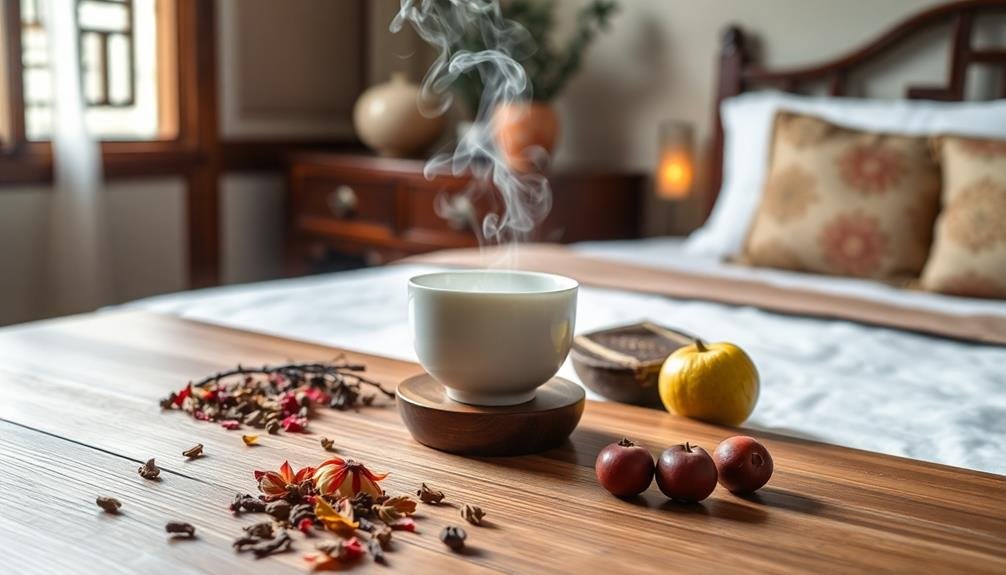
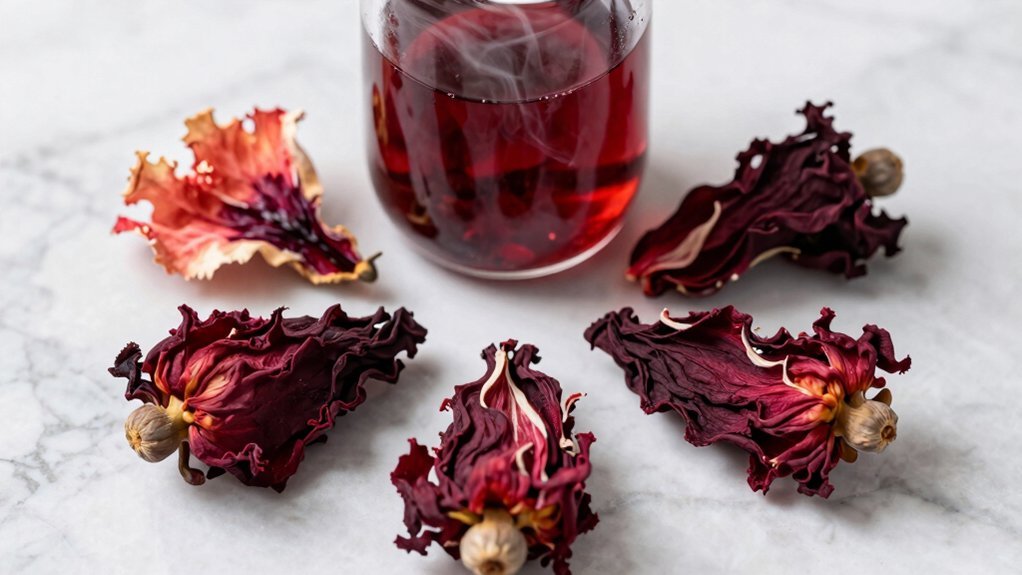


Leave a Reply